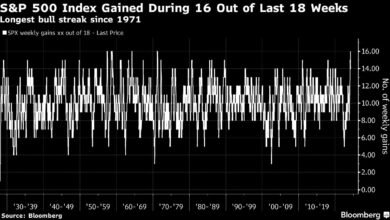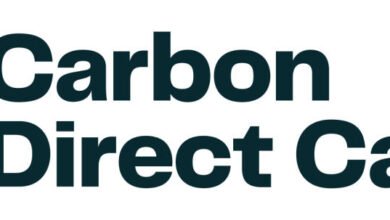Money blog: Financial shock for Microsoft and Crowdstrike after outages – as markets give clear reaction to IT chaos | UK News

It can be hard to balance the demands of eating well without spending a lot. In this series every Friday, we examine everyday supermarket products to help you make informed decisions.
Sunna Van Kampen, founder of Tonic Health, who went viral on social media for reviewing food in the search of healthier choices, and dietician Nichola Ludlam-Raine from nicsnutrition.com offer their expertise.
This week they’re looking at butter v margarine – and, in an illustration that this one might be hard to answer definitively, the expert dietician has a different take to Sunna…
Butter
Sunna’s view – The right choice
Butter has been a staple in kitchens for centuries.
“Made from churned cream, it boasts a natural profile that’s hard to beat [compared with margarine],” Sunna says.
Given it’s a traditional food that is made simply by churning milk, butter is also a minimally processed food.
Here’s where, according to Sunna, butter is good for you…
- Nutrient-rich – Butter contains essential vitamins like A, D, E, and K, which are fat-soluble and crucial for various body functions.
- No additives – Unlike margarine, butter is free from artificial additives, preservatives, making it a cleaner choice.
- Fats – Butter is rich in saturated fats, which Sunna feels have been unfairly demonised in the past. He points to a recent study that tracked 4,150 Swedish 60-year-olds for more than 16 years and found those with the highest intakes of dairy actually had a lower risk of cardiovascular disease than those with low intakes. Sunna says the problems arise when the fats are combined with sugars and low-fibre flours, such as in pies and biscuits. But many dieticians disagree…
Nichola’s view – Moderation is key
“There is an overwhelming amount of evidence to support the replacement of saturated fat with unsaturated fat when it comes to health and preventing cardiovascular disease.
“Unsaturated is fat is predominately found in oily fish as well as plants – from olive oil to nuts, seeds, and avocados too.”
Nichola does seems to agree some saturated fats are better than others – but she doesn’t include butter in this category.
“The saturated fat found in dairy (including milk, cheese and yoghurt) does seem to act differently – and are better choices for heart health – in the body in comparison with the saturated fat found in butter and foods made from butter including biscuits, pies and pastries.
“This is down to differences on a molecular level regarding how the fat is ‘bound’ or encapsulated.”
Nichola goes on: “On the whole I wouldn’t advise anyone have large amounts of butter, or coconut oil for that matter (another product high in saturated fat), especially as most of the time it may be accompanied with refined carbohydrates, such as white bread.
“Moderation is key. For butter lovers, though, my advice is simple – use conservatively (on wholemeal bread!).”
Cost – More expensive
A 250g block of unsalted butter costs around £2.50.
It’s typically between £9.80-£10.40/kg at major supermarkets.
Margarine
Sunna’s view – Too processed
Margarine was invented in 1869 France in response to Napoleon III’s call for a cheap alternative to butter for French workers.
“Today, it’s made from vegetable oils and often has added ingredients that makes this an ultra-processed food,” Sunna says.
“Often marketed as ‘healthy’, they typically combine different seed oils that undergo a process to solidify the oil.
“It’s this process that used to create ‘trans-fats’ which are now known to be as harmful.
“Now, margarines today don’t contain trans fats – but they do contain seed oils which are highly processed and also contain emulsifiers to improve their spreadability and colourings to mimic the appearance of butter.”
Nichola’s view – Often recommended if made from olive or rapeseed oil
“Spreads in the UK became healthier in the 1980s when the processes of hydrogenation was stopped, thus preventing the formation of trans fats.
“I often recommend spreads made with olive oil or rapeseed oil to help increase the proportion of preferred fats in the diet, despite the small amounts of additives, which moderation are nothing to worry about in this context.”
Cost – Cheaper
Margarine is typically slightly cheaper than butter, with prices at around £2.50 per 450g tub, ranging from £5.56-£9.38/kg.
An alternative (that’s also vegan)
“One thing I always recommend for our vegan friends is do as the Italians do – olive oil on toast is a fantastic option,” Sunna recommends.
“It’s the healthiest oil going and tastes amazing once you get used to the drizzle instead of spread.”
It’s rich in monounsaturated fats, which are great for heart health, and contains polyphenols and antioxidants that help fight inflammation.
Olive oil is a good source of vitamins E and K, which support skin health and bone strength.
However, it is more pricey – at around £5 per 250ml bottle, but Sunna says “the health benefits make it worth every penny”.
Verdict
The expert dietician is clear that butter should only be eaten in moderation despite the argument put forward by Sunna about various health benefits.
And she sometimes recommends margarine as long as it is made from olive or rapeseed oils – but Sunna urges you to consider the additives.
Read more from this series…





